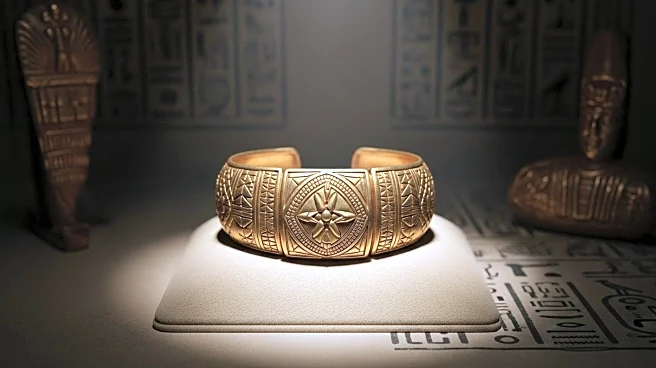What is the story about?
What's Happening?
A 3,000-year-old bracelet belonging to Pharaoh Amenemope was stolen from the Egyptian Museum in Cairo and subsequently melted down for gold. The theft occurred on September 9 while museum officials were preparing artifacts for an exhibit in Italy. Tourism and Antiquities Minister Sherif Fathy attributed the incident to lax security procedures at the museum, which lacked security cameras in the restoration lab where the bracelet was taken. Four suspects have been arrested, including a restoration specialist who confessed to passing the bracelet to an acquaintance. The bracelet was sold through a chain of dealers before being melted down. The suspects have confessed, and the money from the sale has been seized. A judge has ordered the detention of the restoration specialist and her acquaintance for further investigation, while the other two suspects may be released on bail.
Why It's Important?
The theft of the ancient bracelet has sparked outrage in Egypt, highlighting concerns over the security of the nation's cultural heritage. The incident underscores the vulnerability of historical artifacts to theft and the need for improved security measures in museums. The loss of such a significant piece of history is a blow to Egypt's cultural legacy, which is highly esteemed by its citizens. The event has prompted calls for suspending overseas exhibits until better security controls are implemented. This theft also serves as a reminder of past cultural losses, such as the disappearance of Vincent van Gogh's 'Poppy Flowers' from a Cairo museum in 2010, which remains unrecovered.
What's Next?
The ongoing investigation may lead to further arrests and changes in security protocols at the Egyptian Museum and other cultural institutions. There is potential for increased scrutiny and pressure on the government to enhance security measures for antiquities both in exhibition halls and storage facilities. The incident may also influence international policies regarding the loan and exhibition of Egyptian artifacts abroad, as calls for tighter control and security measures grow.
Beyond the Headlines
The theft raises ethical questions about the protection and preservation of cultural heritage. It highlights the challenges faced by countries in safeguarding their historical artifacts from theft and illegal trade. The incident may prompt a reevaluation of security practices and international cooperation in the protection of cultural heritage. Additionally, it could lead to discussions on the responsibilities of museums and governments in ensuring the safety of artifacts.















